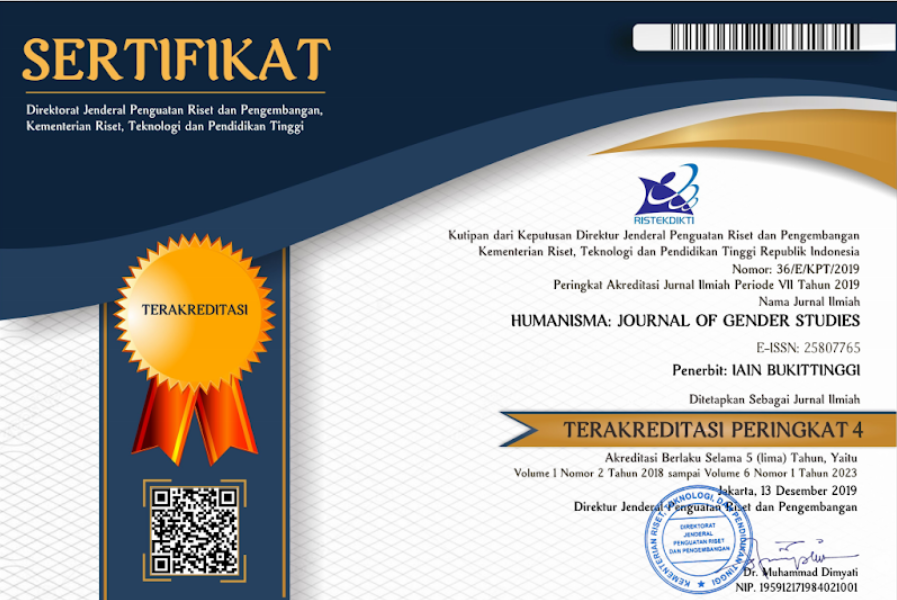Recentering Gender, Transnationalism and War: South Indian Nurses' Experiences in the 2014 Iraq War
DOI:
https://doi.org/10.30983/humanisma.v8i1.8372Keywords:
Iraq war, Transnational Migration, Feminist Ethnography, Gender, MigrationAbstract
and destination countries. This paper explores how the Iraq War (2014) transformed the everyday lives of nurses from Kerala, South India, highlighting the intersection of gender, migration, and violent conflict. Employing a feminist narrative analysis, the study examines in-depth interviews with rescued nurses, their families, and experts involved in the evacuation process. Data was collected through virtual platforms and in-person meetings. The findings reveal that while media narratives often sensationalized the violence, the nurses’ experiences presented nuanced realities of resilience and disruption. Migration, driven by aspirations for a better standard of living, has redefined the perception of nursing in Kerala, challenging traditional gender roles. However, the violent conflict disrupted their professional and personal trajectories, exposing vulnerabilities in transnational support systems. The research also evaluates the Government of India’s evacuation and rehabilitation strategies, identifying gaps in addressing the long-term impacts on these women and their families. By situating these experiences within the framework of the 16th Sustainable Development Goal (promoting peaceful and inclusive societies), this study underscores the urgency of integrating gender-sensitive approaches in conflict-driven migration policies. It contributes to broader debates on South Asian women’s migration and the gendered dimensions of violent conflict.
Pengalaman migrasi transnasional perempuan dibentuk oleh faktor sosial-budaya di negara asal dan negara tujuan. Penelitian ini mengeksplorasi bagaimana Perang Irak (2014) mengubah kehidupan sehari-hari para perawat dari Kerala, India Selatan, dengan menyoroti persinggungan antara gender, migrasi, dan konflik kekerasan. Dengan menggunakan analisis naratif feminis, penelitian ini mengkaji wawancara mendalam dengan para perawat yang diselamatkan, keluarga mereka, dan para ahli yang terlibat dalam proses evakuasi. Data dikumpulkan melalui platform virtual dan pertemuan langsung. Temuan penelitian mengungkapkan bahwa meskipun narasi media sering kali menyoroti kekerasan yang terjadi, pengalaman para perawat menunjukkan realitas yang bernuansa ketahanan dan gangguan. Migrasi, yang didorong oleh aspirasi untuk mendapatkan standar hidup yang lebih baik, telah mengubah persepsi tentang keperawatan di Kerala, menantang peran gender tradisional. Namun, konflik kekerasan tersebut mengganggu perjalanan profesional dan pribadi mereka, memperlihatkan kerentanan dalam sistem dukungan transnasional. Penelitian ini juga mengevaluasi strategi evakuasi dan rehabilitasi Pemerintah India, mengidentifikasi kesenjangan dalam menangani dampak jangka panjang terhadap para perempuan ini dan keluarga mereka. Dengan menempatkan pengalaman-pengalaman ini dalam kerangka Tujuan Pembangunan Berkelanjutan ke-16 (mempromosikan masyarakat yang damai dan inklusif), penelitian ini menggarisbawahi pentingnya mengintegrasikan pendekatan yang peka terhadap gender dalam kebijakan-kebijakan migrasi yang dipicu oleh konflik. Studi ini berkontribusi pada perdebatan yang lebih luas tentang migrasi perempuan Asia Selatan dan dimensi gender dari konflik kekerasan.
References
Abraham, Binumol. 2004. Women Nurses and the Notion of Their “Empowerment, Kerala Research Programme on Local Level Development, (Centre for Development Studies) <http://www.cds.ac.in/krpcds/publication/downloads/88.pdf>
Abraham, Meera. 1996. Religion, Caste, and Gender (BI Publications Pvt Ltd)
Astbury, Jill. 1999. Gender and Mental Health (Harvard Center for Population and Development Studies) <https://citeseerx.ist.psu.edu/document?repid=rep1&type=pdf&doi=f8d3d0a88da7a5f17b8763fa3d452e2da146fe00>
Balan, Divya. 2022. “Migration of Female Nurses; Conceptual Errors and Realities.,” Sanghaditha<https://www.sanghaditha.com/wp-content/uploads/2022/02/layout-feb2022.pdf>
BBC. 2018. “Islamic State and the Crisis in Iraq and Syria in Maps,” BBC (BBC) <https://www.bbc.com/news/world-middle-east-27838034>
Behera, Navnita Chadha (ed.). 2006. Gender, Conflict and Migration (Women and Migration in Asia) (Sage India)
Cervantes, Andrea Gómez. 2016. “Transnational Motherhood,” Encyclopedia of Family Studies: 1–6 <https://doi.org/10.1002/9781119085621.wbefs091>
Datta, Amrita, and Arani Basu. 2023. “Do the Kerala Nurses in Germany Break the Myth of Migration as a Male-Space?,” Migration & Diversity, 2.3 <https://doi.org/10.33182/md.v2i3.3066>
Davar, Bhargavi V. 1995. “Mental Illness among Indian Women,” Economic and Political Weekly, 30.45: 2879–86 <http://www.jstor.org/stable/4403424>
DeLaet, Debra L. 1999. “Introduction: The Invisibility of Women in Scholarship on International Migration,” in Palgrave Macmillan UK eBooks, pp. 1–17 <https://doi.org/10.1057/9780333983461_1>
George, Sheba. 2005. When Women Come First (Univ of California Press)
“Goal 10 | Department of Economic and Social Affairs.” [n.d.]. <https://sdgs.un.org/goals/goal10>
“Goal 16 | Department of Economic and Social Affairs.” [n.d.]. <https://sdgs.un.org/goals/goal16>
Healey, Madelaine. 2013. Indian Sisters: A History of Nursing and the State, 1907–2007
Hondagneu-Sotelo, Pierrette. 2000. “Feminism and Migration,” the Annals of the American Academy of Political and Social Science/the Annals, 571.1: 107–20 <https://doi.org/10.1177/000271620057100108>
Ians. 2021. “India Rescues 58 More Nurses from Troubled Iraq,” The Hindu<https://www.thehindu.com/news/national/India-rescues-58-more-nurses-from-troubled-Iraq/article60381524.ece>
IOM UN Migration. 2021. World Migration Report 2022, International Organization for Migration (INTERNATIONAL ORGANIZATION FOR MIGRATION) <https://publications.iom.int/books/world-migration-report-2022>
“Islamic State and the Crisis in Iraq and Syria in Maps.” 2018. BBC News<https://www.bbc.com/news/world-middle-east-27838034>
Jazeera, Al. 2014. “Indian Nurses Stranded in Iraq Return Home,” Al Jazeera<https://www.aljazeera.com/news/2014/7/5/indian-nurses-stranded-in-iraq-return-home>
Jose, Neenu. 2014. “I Was an ISIS Hostage: A Kerala Nurse’s Iraq Diary,” NDTV<https://www.ndtv.com/blog/i-was-an-isis-hostage-a-kerala-nurses-iraq-diary-593731>
Kofman, Eleonore. 1999. “Female ‘Birds of Passage’ a Decade Later: Gender and Immigration in the European Union,” the International Migration Review/International Migration Review, 33.2: 269 <https://doi.org/10.2307/2547698>
Mahler, Sarah J., and Patricia R. Pessar. 2006. “Gender Matters: Ethnographers Bring Gender from the Periphery toward the Core of Migration Studies,” the International Migration Review/International Migration Review, 40.1: 27–63 <https://doi.org/10.1111/j.1747-7379.2006.00002.x>
“Mental Illness among Indian Women on JSTOR.” [n.d.]. Www.Jstor.Org<http://www.jstor.org/stable/4403424>
Nair, Sreelekha. 2012. Moving with the Times, Routledge eBooks<https://doi.org/10.4324/9781003157953>
O’Neil, Tam, Anjali Fleury, and Marta Foresti. 2016. Women on the Move: Migration, Gender Equality and the 2030 Agenda for Sustainable Development, ODI (Swiss Agency for Development and Cooperation SDC) <https://media.odi.org/documents/10731.pdf>
Percot, Marie. 2006. “Indian Nurses in the Gulf: Two Generations of Female Migration,” South Asia Research, 26.1: 41–62 <https://doi.org/10.1177/0262728006063198>
———. 2022. “The Women Who Paved the Way: At the Beginning of Indian Nurses Migration. (Pp. 1–11). Routledge,” in India Migration Report 2022 - Health Professional’s Migration, ed. by S Irudaya Rajan (Routledge), pp. 1–11 <https://doi.org/10.4324/9781003315124-1>
Percot, Marie, and S Irudaya Rajan. 2007. “Female Emigration from India: Case Study of Nurses,” Economic and Political Weekly, 42.4: 318-325.
Pessar, Patricia R., and Sarah J. Mahler. 2003. “Transnational Migration: Bringing Gender In,” the International Migration Review/International Migration Review, 37.3: 812–46 <https://doi.org/10.1111/j.1747-7379.2003.tb00159.x>
Stevens, Peter a J. [n.d.]. “Narrative Analysis: Analyzing ‘Small Stories’ in Social Sciences,” in Qualitative Data Analysis: Key Approaches (Sage Publications), pp. 83–106
United Nations Human Rights. 1990. International Convention on the Protection of the Rights of All Migrant Workers and Members of Their Families, United Nations Human Rights (United Nations Human Rights) <https://www.ohchr.org/en/instruments-mechanisms/instruments/international-convention-protection-rights-all-migrant-workers>
Woodiwiss, Jo, Kate Smith, and Kelly Lockwood. 2017. “Introduction: Doing Feminist Narrative Research,” in Palgrave Macmillan UK eBooks, pp. 1–10 <https://doi.org/10.1057/978-1-137-48568-7_1>
Downloads
Published
Issue
Section
License
Copyright (c) 2024 Chaithanya Kenoth

This work is licensed under a Creative Commons Attribution-ShareAlike 4.0 International License.
Authors who publish with this journal agree to the following terms:
- Authors retain copyright and grant the journal right of first publication with the work simultaneously licensed under a Creative Commons Attribution-ShareAlike 4.0. that allows others to share the work with an acknowledgment of the work's authorship and initial publication in this journal.
- Authors are able to enter into separate, additional contractual arrangements for the non-exclusive distribution of the journal's published version of the work (e.g., post it to an institutional repository or publish it in a book), with an acknowledgment of its initial publication in this journal.
- Authors are permitted and encouraged to post their work online (e.g., in institutional repositories or on their website) prior to and during the submission process, as it can lead to productive exchanges, as well as earlier and greater citation of published work (See The Effect of Open Access).


















